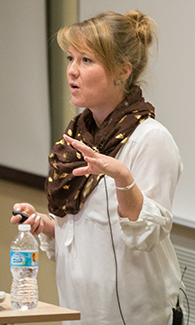Friday, January 8, 2016
Understanding Human Trafficking: a Physician’s Role
Fri, 08 Jan 2016Shelley Andrews :: LUCOM Marketing and PR
“People think slavery was abolished years ago, but in fact, we have more slaves today than we’ve ever had in history.”
According to Joy Marinelli, National Race Director for the Lynchburg non-profit Freedom 4/24, human trafficking is the modern day form of slavery.
 In a presentation at Liberty University College of Osteopathic Medicine (LUCOM) on Jan. 6, she helped student-doctors understand the criminal enterprise and what they may encounter as future physicians. The LUCOM-American Medical Women Association (AMWA) organized the event.
In a presentation at Liberty University College of Osteopathic Medicine (LUCOM) on Jan. 6, she helped student-doctors understand the criminal enterprise and what they may encounter as future physicians. The LUCOM-American Medical Women Association (AMWA) organized the event.
“As medical professionals you probably have more of an awareness [about human trafficking] than most people, but a lot of people are really shocked that this is going on in our world today,” said Marinelli.
By using the statistics available about human trafficking, Marinelli gave the grim details. Human trafficking is the fastest growing criminal enterprise and is the second largest criminal industry in the world right now. There are at least 27 million slaves worldwide.
“The internet has fueled this problem because it allows anonymity. And that has helped to make the trade of women and children easier than ever before,” said Marinelli.
While women and children make up 80 percent of the victims and are often involved in sexual abuse or prostitution, Marinelli says males are affected too, usually being forced into the labor trade.
She explained how human trafficking isn’t just an international problem. There is proof that it’s a major issue in the United States, especially in California. There are also signs of criminal behavior very close to home in Lynchburg.
Knowing this information, Marinelli says LUCOM student-doctors must be vigilant about the warning signs of human trafficking and striking up the right conversation.
“Sometimes, if you are just seeing them at a clinic, you won’t be able to observe their living conditions,” said Marinelli. “ But you can assess them quickly by asking the right questions.”
Those questions include: Can you leave your job if you want to? Have you been hurt or threatened? Do you live with your employers? Where do you eat, sleep etc.? Do you have identification?
“They may view you as authority and may not want to talk to you because they are fearful. But this is a good starting point,” said Marinelli.
In December, LUCOM Office of Student Services Coordinator Meagan Eckhardt traveled to Bangkok, Thailand with a team of seven women to work with a Freedom 4/24 partner, Home of New Beginnings. The team would go to bars in the red light district and pay the bar fines for as many girls as possible. Then, they would bring those girls to a Christmas party that included crafts, games and important information about available safe houses.
“Each girl we encountered had value. Each girl had worth. It was a privilege to show them that for a night,” said Eckhardt.
Based on her experience, she believes that having the ability to spot the signs of human trafficking enables student-doctors to make a difference.
“As we raise awareness for those being forced into slavery, we enable others through knowledge of the situation, and therefore foster motivation to action,” said Eckhardt.
Freedom 4/24 exists to bring freedom and justice to those involved in human trafficking. To learn more about the non-profit and their upcoming “Run 4 Their Lives” race at Liberty University, visit their website.